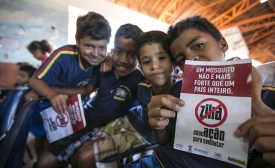haiti
In the wake of Hurricane Matthew, one Haitian-American doctor is fighting back against cholera, a disease that has devastated her parents’ home country. Starting just after sunrise each morning, Dr. Naima Joseph begins work at the cholera treatment unit in Les Anglais on Haiti’s southern peninsula. For about 12 hours each day, Naima and a dozen Haitian nurses and aides treat patients believed to be suffering from potentially lethal waterborne diseases.
The Cuban government announced today it is sending a medical team to Haiti for the relief of the victims after the devastating hurricane “Matthew”, local media reported. “A brigade of 38 Cuban doctors specialized in disaster situations will leave for Haiti,” said an official note read on Cuban television.
Several governments in Latin America have expressed their solidarity with Haiti and have offered humanitarian aid after Hurricane Matthew caused over 800 deaths and significant material losses in the Caribbean nation. Food, bottled water, mattresses as well as machinery to remove rubble and medical staff form part of the convoys that different Latin American countries have sent to help the island.
Empower2Play will be hosting a ten-day sports diplomacy event in Cite Soleil, Haiti, one of the most dangerous neighborhoods in the world. This event will be hosted with the US Embassy and will be focusing on using American Football to gets kids active and expand knowledge of the game in an area that could use a distraction from the daily situation.
On the heels of the largest sports diplomacy event, the 2016 Rio Olympics, Empower2Play will launch its very own ten-day sports diplomacy event with the US Embassy in Cite Soleil, Haiti, incorporating American Football, which begins on September 10th. [...] This event will bring together over 300 local youth and 100 volunteers from around the world.
In an earlier post, I speculated that preventing a Zika virus epidemic would rally transnational diaspora organizations. Since then, concern has grown among U.S.- and Canadian-based diasporans, especially those with roots in Brazil, Puerto Rico, the Dominican Republic, Haiti, and other Latin American countries. Caribbean American and global media are featuring stories and public service announcements on the outbreak, but so far, I have observed no major non-governmental diasporan response.

Taking advantage of partnerships to stop the spread of Zika.
Transparency International chapters in the Caribbean plan to work together to share their expertise and experience across the region and form the Transparency International Caribbean Network. This network will bring together Transparency International chapters in Jamaica, Haiti and Trinidad and Tobago, one partner organisation in Guyana and one in Bahamas that recently joined plus experienced regional anti-corruption activists in St. Kitts and the Cayman Islands.







